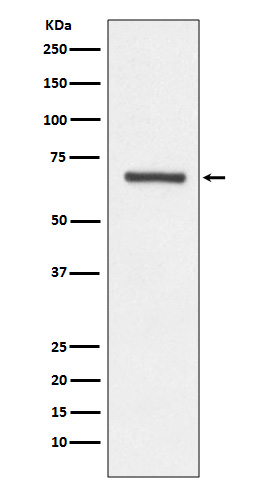
| WB | 1/500-1/1000 | Human,Mouse,Rat |
| IF | 咨询技术 | Human,Mouse,Rat |
| IHC | 咨询技术 | Human,Mouse,Rat |
| ICC | 技术咨询 | Human,Mouse,Rat |
| FCM | 咨询技术 | Human,Mouse,Rat |
| Elisa | 咨询技术 | Human,Mouse,Rat |
| Aliases | ANGPT1; KIAA0003; Angiopoietin-1; ANG-1 |
| Entrez GeneID | 284 |
| WB Predicted band size | Calculated MW: 58 kDa; Observed MW: 58 kDa |
| Host/Isotype | Rabbit IgG |
| Antibody Type | Primary antibody |
| Storage | Store at 4°C short term. Aliquot and store at -20°C long term. Avoid freeze/thaw cycles. |
| Species Reactivity | Human,Rat |
| Immunogen | A synthesized peptide derived from human Angiopoietin 1 |
| Formulation | Purified antibody in PBS with 0.05% sodium azide. |
+ +
以下为关于Angiopoietin 1抗体的3篇参考文献及其摘要概括:
1. **"Angiopoietin-1 protects the adult vasculature against plasma leakage"**
- **作者**:Thurston et al. (2000)
- **摘要**:该研究通过注射重组Angiopoietin-1(Ang1)及使用特异性抗体,证明Ang1能增强血管内皮细胞连接稳定性,抑制炎症诱导的血管渗漏,提示其治疗血管通透性相关疾病的潜力。
2. **"Angiopoietin-1 inhibits vascular permeability, inflammation, and tissue fibrosis"**
- **作者**:Jeon et al. (2013)
- **摘要**:研究利用Ang1中和抗体及基因敲除模型,发现Ang1通过激活Tie2受体信号通路,抑制炎症因子(如VEGF)介导的血管渗漏和器官纤维化,为抗纤维化治疗提供新靶点。
3. **"Combinatorial inhibition of VEGF and Angiopoietin-1 improves antitumor efficacy"**
- **作者**:Holash et al. (1999)
- **摘要**:通过联合使用Ang1抗体与VEGF抑制剂,发现双重阻断可显著破坏肿瘤血管生成并诱导血管退化,增强抗肿瘤效果,揭示了Ang1/VEGF协同调控肿瘤血管的机制。
*注:若需补充更多文献或实验细节,建议通过PubMed或Web of Science以“Angiopoietin-1 antibody”为关键词进一步筛选。*
Angiopoietin 1 (Ang-1) is a key regulatory protein involved in vascular development and homeostasis, primarily known for its role in stabilizing blood vessels and promoting vascular maturation. It binds to the Tie2 receptor on endothelial cells, triggering signaling pathways that enhance cell survival, reduce vascular permeability, and suppress inflammation. Dysregulation of Ang-1/Tie2 signaling is implicated in various pathologies, including cancer, cardiovascular diseases, and inflammatory disorders. Antibodies targeting Ang-1 are essential tools for studying its expression, function, and interactions in both physiological and disease contexts.
Angiopoietin 1 antibodies are widely used in research applications such as Western blotting, immunohistochemistry, and immunofluorescence to detect Ang-1 protein levels and localization in tissues or cell cultures. They also enable functional studies, including blocking Ang-1/Tie2 interactions to investigate downstream signaling effects. Commercially available antibodies are typically raised in hosts like rabbits or mice, with validation across multiple species depending on the target epitope. Researchers often utilize these antibodies to explore Ang-1's therapeutic potential, such as in promoting vascular repair or inhibiting pathological angiogenesis in tumors. Recent studies also highlight their utility in dissecting Ang-1's role in modulating immune responses and maintaining endothelial integrity during sepsis or acute lung injury. Proper validation of antibody specificity remains critical, as cross-reactivity with related angiopoietin family members (e.g., Ang-2) can occur.
×